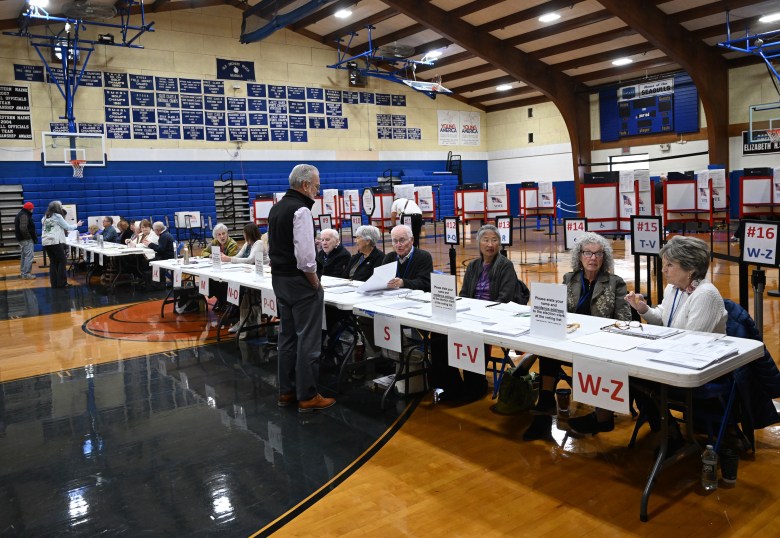
Editor’s note: With polls closing at 8 p.m., we are shifting our live feed to focus on results. Click here to view. Our earlier live feeds from throughout Election Day are below.
Maine voters are heading to the polls Tuesday to weigh in on a pair of statewide referendum questions and, in some communities, to decide local races and referendums.
Voters across Maine will consider Question 1, which would require photo identification at the polls, limit the number and location of ballot drop boxes, and make several changes to absentee voting, including an end to ongoing absentee voting and requesting absentee ballots by phone.
Question 2 on the statewide ballot asks voters if they want to approve a so-called red flag law, which would make it easier to confiscate firearms from a person in crisis by allowing family members, not just law enforcement, to petition a judge for a temporary removal order. It would also eliminate the requirement for a mental health evaluation, as is required in Maine’s current yellow flag law.
Voters in some communities will consider local referendum questions and elect candidates to municipal office. In Portland, for example, voters are considering a proposal to raise the minimum wage, while in Scarborough, residents are voting on a $130 million school infrastructure project.
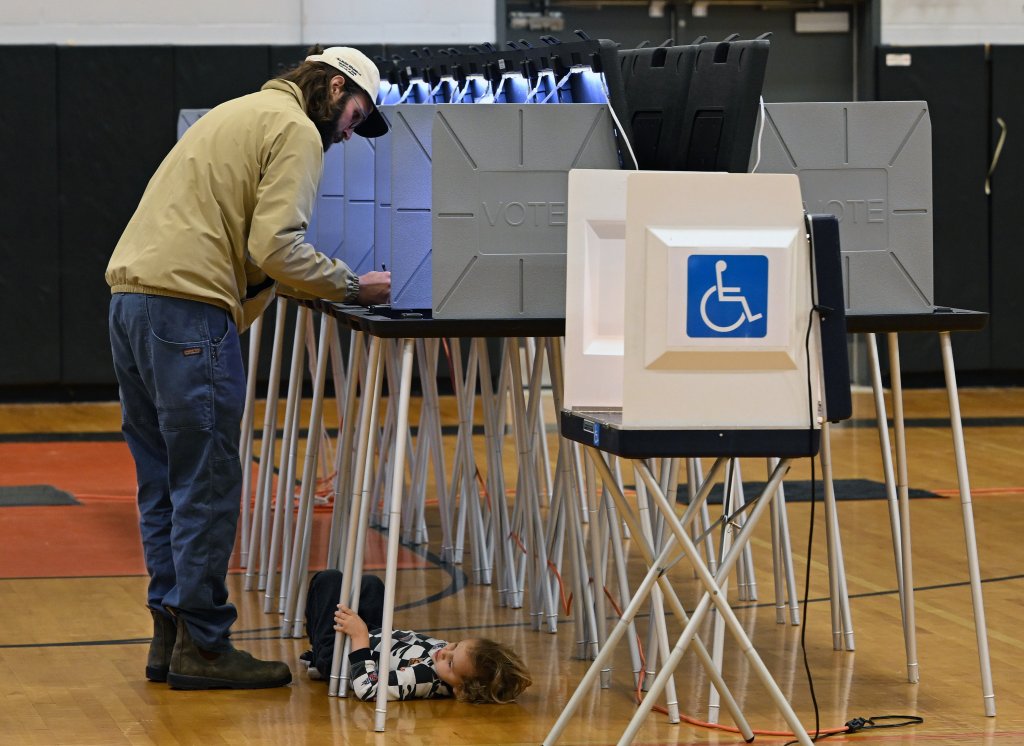
Turnout is expected to be relatively low due to a lack of major statewide or national candidate races on the ballot, but election officials throughout Tuesday said turnout appeared to be higher than usual for an off-year election.
Requests for, and returned absentee ballots, outpaced the last off-year election. More than 121,000 voters had requested absentee ballots, and nearly 77,000 had returned them by Oct. 28. Maine has about 1 million active registered voters.
Want more information, like what each referendum question means, who’s on your ballot and news from your city or town? Check out our Election 2025 hub.
7:45 p.m.: Gardiner residents weigh proposed voting changes
Gardiner resident Sharon Nelson said she voted “no” on Question 1 because her friend votes absentee, and she was concerned that the proposed changes would put up too many barriers and effectively prevent her friend from voting.
But Greg Rand, who accompanied Nelson to Gardiner’s polling place at the Kennebec Valley Boys & Girls Club, said he voted “yes” on Question 1.
“For voter ID — we need to have IDs if we buy a beer, take out a loan or go to the bank,” Rand said. “And voting’s very important.”
Keith Vallencourt also voted “no” on Question 1, saying that he was concerned that measures pushed by the Republican Party would silence the voices of many marginalized people.
“It feels like one party is deliberately trying to limit certain people from voting because they think they’ll vote a certain way,” Vallencourt said.
— Ethan Horton, staff writer
7:30 p.m.: Newly consolidated voting went smoothly in Augusta
As a steady flow of voters entered the expansive auditorium of the Augusta Civic Center Tuesday evening, City Clerk Kelly Gooldrup said consolidating all voting at the city-owned building appeared to go smoothly and was well-received by most voters.
The polls were consolidated from the city’s previous four voting ward location for the first time since a city council vote to centralize all voting, other than absentee, at the civic center.
“It’s been mostly positive,” Gooldrup said of residents’ reactions to the consolidated polling location.
She said other than a rush of voters between 4 and 6 p.m., which is typical as people get out of work and come to vote, waiting lines vote were rare.
The city provided two vans, one of which is accessible by people in a wheelchair, to give people rides from the former ward polling sites to the Civic Center, and back. She said she’d heard from voters who used, and appreciated, the vans to get to the polls.
About 3,215 Augusta residents had voted by 6:30 p.m., at the polls, and the city also received about 2,200 absentee ballots. The city has about 12,000 registered voters.
— Keith Edwards, staff writer
7:15 p.m.: ‘Every election is important’ in Freeport
Freeport always has a strong turnout on Election Day, and it’s not unusual to have 20% of the population voting, town officials said Tuesday. There’s been a steady flow of voters all day, with a line at the door when the polls opened, said Town Clerk Christine Wolfe.
Around 31% of absentee ballots in Freeport had been put through tabulating machines by late Tuesday afternoon, said election warden Steve McPheters.
Lindsay Dickerson, 44, said she turned out for the state ballot questions, in particular because she wanted to protect absentee voting for her elderly mother and disabled Mainers.
“We don’t exercise our rights, we lose them,” Dickerson said. “Every election is important.”
Susan Giggey, 65, turned out to vote with her grandson Nicholas Chiasson, 18, a first-time voter.
“I think that is really important for senior citizens and all the people who find it hard to walk in here and vote on Election Day,” Giggey said. “We shouldn’t lose any ground on that at all. That is how I feel.”
Chiasson recalled participating in mock elections in elementary school. He said Question 2 drew his attention in this real election because he feels Mainers should take every precaution available when it comes to mental health safety.
—Paul Bagnall, staff writer
7 p.m.: Gray and Windham weigh in
Gray Town Clerk Britt Barton said the Newbegin Community Center had seen a steady turnout most of the day, with a larger voter participation than expected. She noted that the town was on track to exceed voter participation from the previous off-year election in 2023, when 2,693 Gray residents cast ballots. By 2:30 p.m. Tuesday, turnout had already exceeded 2,000.
Gray resident Jeff Preble said he voted “yes” on Question 1, explaining that, since many other activities require an ID, he felt it made sense for something important as voting to need one.
At Windham High School’s auxiliary gym, lines stretched out even into the cold evening, as the candidates for RSU 14’s school board greeted potential voters.
Kate Schroeder said she didn’t vote in the local races because she was unfamiliar with the candidates and thought it would be unfair for her to cast a ballot without being properly informed.
Schroeder, who voted in favor of Question 1 and against Question 2, said states should make decisions on voter ID, and she trusted Maine to something about the issue in a constructive way.
James Vopal voted against Question 1 and in favor of Question 2.
“I don’t think we need to restrict access to voting,” Vopal said. “It’s important to put some rules on who should have guns. It’s good for people struggling with mental health.”
— Rory Sweeting, staff writer
6:45 p.m.: Voting seen as a “duty” in Sanford
Gerry Gay, a candidate for Sanford City Council, stood outside of Sanford High School all day, taking only a lunch break, to thank each voter for taking their time to come out. He saw the turnout, and with his knowledge of his community, he felt hopeful.
Gay feels the people of Sanford had more than just absentee ballots on their mind.
“There’s a lot of people angry in this community. A lot of it’s got to do with the needle exchange program. It’s unfortunate. … We’ve got a problem, but when you give them the very thing that’s hurting them, you’re enabling the problem. We have to do better.”
Randy White, 58, of Sanford, believes voting isn’t just a right, it’s a duty: “It’s what every one of us should be doing every time the opportunity is there.”
— Abigail Driscoll, staff writer
6:15 p.m.: Secretary of State says statewide turnout has been strong
Secretary of State Shenna Bellows reported that more than 146,000 absentee ballots had been issued across Maine and nearly 131,000 had been returned by early Tuesday evening.
“We’ve seen steady turnout throughout the state coupled with very strong absentee voting,” she said.
— Kelley Bouchard, staff writer
6 p.m.: Downtown Portland voters focused on state questions over local elections
Portland voters steadily filed in to Merrill Auditorium on Tuesday evening, where former City Councilor Anna Trevorrow stood outside greeting voters.
“I’m a friend of Pious Ali’s,” she said as voters walked through the door.
Andre Heppe, 32, left the auditorium just after 6 p.m. He said his experience at the polls was easy and fast.
Heppe said he turned out primarily to vote on Questions 1 and 2.
“I feel like it would be helpful for more people to be able to report suspicious actors,” said Heppe of Question 2, which he supported.
Poll warden Carol Morrissette said voter turnout had been steady all day, with 1,154 votes cast at the auditorium by early evening, she said.
“It’s been slow and steady, very steady. It is a little bit busier than I expected, which is good,” Morrissette said.
Evelyn Gross, 31, said it was her first time voting in Portland since she moved from Windham.
She was most concerned about the state and local referendum questions on the ballot. She said absentee voting access is important to her.
“I’m a nurse so I know a lot of my patients have trouble voting because they can’t get out of their houses,” Gross said.
She also supported a minimum wage increase in Portland.
“I remember (when) minimum wage was $7.25 back in the day,” she said. “That $19 an hour seems so high to me, but living in Portland is so expensive. I can barely do it on my salary, so if it helps people afford to live here, (I) think we should do it.”
—Grace Benninghoff, staff writer
5:45 p.m.: Scarborough braces for school referendum vote
On the corner of Municipal Drive in Scarborough, people twirling signs competed for the attention of passing motorists.
Jeff Ball, Rick Waterhouse and Brian Kanode held red signs urging voters not to vote for the school referendum questions on the ballot. The sign said “up to $140 million” is “still too high.”
“I think it’s unfair for many Scarborough residents, especially those on a fixed income,” Kanode said. He worries that the subsequent property tax hikes would not be affordable for most people.
A few paces down the road, Crescencia Maurer, a candidate for School Board, waved a different sign, a green one. She’d been out since 7 a.m., urging people to support the school building overhaul. It’s one of the main reasons she decided to run for office.
“I’ve been getting positive feedback from the honking,” she said.
A steady stream of voters entered the Scarborough High School gymnasium down the road. The municipal bond was front of mind for many of them.
Tuck Barclay, 72, said he’d been following along with the school building process and ultimately voted in support of both questions.
On the other hand, Raymond Herman said the project seemed too exorbitant. He voted no on the first question.
— Dana Richie, staff writer
5:30 p.m. — Hall-Dale gym bustling
A friend brought a chocolate McDonald’s milkshake into the Hall-Dale Elementary School’s gymnasium for Hallowell City Clerk Lisa Gilliam around 5 p.m. Tuesday. It was the first food she had eaten — or sipped — since polls opened.
Turnout has been surprisingly high, Gilliam said, so she’s been busy. By 5 p.m., more than half of Hallowell’s registered voters had already cast their ballots for two uncontested City Council races, a write-in contest for the Regional School Unit 2 board, and the two statewide referenda.
Gilliam even sent for deputy city clerk Daniel Kelley to bring more referendum ballots from City Hall after ballot clerk Judy Feinstein informed her there were “less than — no, sorry, fewer than — 20 state ballots left.”
— Ethan Horton, staff writer
5:25 p.m.: ‘Where the rubber meets the road’ in North Yarmouth
Rep. Anne Graham, D-North Yarmouth, greeted voters outside of the North Yarmouth Community Center as they entered to vote. Graham voiced her support for Select Board candidate Molly Gilligan, who is running against Dana Rogers. She also emphasized the importance of local elections and governments, thanking voters for coming out as they entered the building.
“Local government, that’s where the rubber meets the road,” she said.
With almost half of North Yarmouth’s 3,579 registered voters already casting ballots by 5 p.m., the turnout for the election looks like it will be higher than other referendum years.
“It’s better than usual probably due to the local ballot,” said Town Clerk Debbie Allen Grover.
Many North Yarmouth voters said they always vote, no matter the election, including Barry Somes, 70. For Select Board, he voted for Rogers.
“He had a nice write-up, and people on social media were really pushing for him,” Somes said. “I haven’t heard anything about the other person.”
— Sophie Burchell, staff writer
5:20 p.m.: Portlanders motivated to vote down Question 1
At the Italian Heritage Center on outer Congress Street, the crowd late Tuesday afternoon was thin but steady. Outside a huge, beautiful full moon hung low in the sky. Inside, an election volunteer said the morning hours had been so busy that she hadn’t been able to take a break in three hours.
Trey Cox, 26, of Portland, said he was motivated by one issue: “No on (Question) 1. I think we should refrain from limiting voter access.”
That’s also what brought Colleen Griffin, 64, to the polling place. “I did not support changing the law,” she said firmly.
Henry Lago, 70, said he was there because he always votes. He added he was certainly paying attention this election, noting 2026 U.S. Senate candidate Graham Platner’s “vehemence against restrictions on absentee voting. I agree with him.”
Becky Roman, 54, was there, as always, “just to vote any time I can vote,” she said.
— Peggy Grodinsky, food editor
5:15 p.m.: Kennebunk experiences steady voter turnout despite wind
Suzanne McKechnie, 57, who votes in every election, felt particularly strong about how Question 1 would affect absentee ballots as she cast her vote in Kennebunk on Tuesday.
“I definitely wanted to make sure that absentee ballots were still available,” she said. “I do think that we have a high number of elderly people that deserve the right to exercise their vote.”
Town clerk Merton Brown said this year was an outlier to prior referendum elections, due to the town’s budget failures earlier this year.
“This one’s very different,” Brown said. “It’s our third school board referendum. We’ve had over 50 new registrations today. We’ve had 2,500 absentees. As of 4:30 p.m., 2,800 voters. This is the first time this has ever happened.”
— Abigail Driscoll, staff writer
5:10 p.m.: Voters turn out in Portland
Voters in Portland slowly trickled into the Reiche Community School early Tuesday evening as the wind picked up outside and the sun began to set.
Poll warden Susan McMillan said she had seen a higher turnout than expected.
“It’s been mostly steady, but we’ve definitely had more rushes than I would have expected,” saidshe said. “This is a pretty good turnout for an off-year election.”
Heather Adams, 42, left the polling place with her 8-year-old, Piper, in tow. She said lines were short and getting to her polling place was easy.
Adams said she came out to vote because she wanted to vote “no” on Portland’s minimum wage referendum, “no” on statewide Question 1 and “yes” on Question 2.
“($19 an hour) is a huge number for mom-and-pop stores,” she said. “You’re basically saying that only the giant corporations deserve to be in business, which is exactly the opposite of what people want.”
Kylie Briand, 23, said she turned out Tuesday just because she loves to vote.
“I love voting, ever since I turned 18. I think everyone needs to vote, so I’m here, I’m doing it,” she said.
Briand said she felt torn on how to vote on raising the minimum wage but ultimately voted in favor of it.
“Cost of living is so expensive, it’s worth a shot,” she said. “We definitely need other solutions too, but I think we should start there.”
Both Briand and Adams said they didn’t feel they knew much about the at-large City Council election between incumbent Pious Ali and newcomer Sam Aborne, but both said they ultimately voted for Ali.
“I voted for Ali to stay because I know he’s done a lot of good things and I couldn’t find any reason not to,” Briand said.
—Grace Benninghoff, staff writer
5:05 p.m. — Cumberland, North Yarmouth polls unaffected by power outages on windy day
High winds Tuesday brought a smattering of residential power outages in Cumberland and North Yarmouth, including at the SAD 51 schools. However, polling locations for both towns are not concerned about losing power.
Neither Cumberland Town Hall nor the North Yarmouth Community Center have seen the lights even flicker, poll workers said. Even if the power did go out, both locations have generators and voting would not be impacted, election officials said.
— Sophie Burchell, staff writer
5 p.m.: Turnout strong in Richmond, despite lack of local ballot issues, high winds
A steady stream of voters lined up inside the town office in Richmond to vote early Tuesday evening, despite a lack of local races, meaning only the two state referendum questions are on the ballot.
Election workers said turnout was strong, especially for a nonpresidential election.
Despite high winds in the area, the Richmond office polling site didn’t lose power, worker said, though it has a backup generator just in case.
— Keith Edwards, staff writer
4:45 p.m.: Falmouth turnout strong for state, local referendums
By late afternoon, over 2,400 Falmouth voters had cast their ballots in the Falmouth High School gym. With another 2,600 absentee ballots in, Town Clerk Ellen Planner said Falmouth is well on its way to have more than half of its 10,760 registered voters participate in this election.
“It’s a good turnout for referendum only,” Planner said. “It’s been steady all day.”
Planner guessed that both the state and municipal questions prompted the high turnout. Falmouth residents exiting the polls echoed this reasoning.
“There are interesting things on both ballots,” said Roy Cobean, 67.
While he said he votes in every election regardless, Cobean wanted to cast a “no” vote on Falmouth’s Question 1 against repealing the contentious pesticide and fertilizer ordinance.
“I voted to protect it. It’s imperfect, but a step on the right direction,” he said.
Alex Valente, 30, moved to Falmouth in August and soon got caught up to speed on the pesticide ordinance’s long journey. She said voting against its repeal motivated her trip to the polls.
“I saw the signs all over town and did some research, and wanted to come vote,” she said.
— Sophie Burchell, staff writer
4:30 p.m.: Town of China works through technical issue at the polls
In the Kennebec County town of China, Town Clerk Angela Nelson said there was a slight hiccup early in the morning: The battery was quickly dying on the electronic ballot tabulator.
Town officials had to contact the Maine Secretary of State’s Office for help, while some newly cast ballots were placed in an auxiliary box until the machine issue was fixed.
Ultimately, officials determined that the tabulator machine was simply not plugged in all the way to the outlet, causing the battery to drain.
“We were worried there for a few minutes,” Nelson said.
Nelson said that by 3:20 p.m., 845 ballots had been cast on Election Day and another 223 absentee ballots had been processed. That meant 1,068 of the town’s 3,157 registered voters had cast ballots with just over four hours left until the polls closed.
— Scott Monroe, managing editor
4:15 p.m.: Brunswick voters turn out for state referendums
Three of Brunswick’s Town Council districts had contested elections Tuesday, though a handful of voters leaving the town’s polling place at the Brunswick Recreation Center said their main motivation for voting was the state ballot questions.
Barbara and Scott Manter said they both voted “yes” on Question 1 and “no” on Question 2.
A group of Bowdoin College students casting their votes said they also said they were interested in the statewide ballot questions.
“I’ve been trying to be more civically minded, and I feel like I heard about these questions, especially the one that would restrict absentee voting, (which) I definitely felt opposed to … and the gun control legislation, I was in favor of,” said student Liam Kelly-Thompson.
— Katie Langley, staff writer
3:45 p.m.: South Portland voters consider athletic field options
Lines were short inside the South Portland Community Center on Tuesday afternoon as autumn winds kicked up outside.
Warden Jon Hartford said turnout had been pretty steady since the polls opened at 7 a.m., with about 25 people were waiting outside beforehand, including some who arrived at 6:35 a.m.
Hartford said turnout at the community center might surpass the previous off-year election in 2023, when 2,400 voters cast ballots at the city’s largest polling place. By noon Tuesday, 1,640 voters had cast ballots — a pace of about 200 voters an hour, he said.
Hartford attributed the high turnout to municipal referendum questions on whether to include a new grass field or a turf field in a high school stadium renovation.
“There’s a lot of passionate folks on both sides of the issue,” Hartford said.
Terry Walker, 50, said he voted in favor of a new natural grass field and against synthetic turf because it would cost more and would have to be replaced in about 10 years. Both measures would add permanent restrooms at the stadium, a new track and new lighting.
Walker said he voted “no” on Question 1 because Maine is a rural state and so many people need to vote absentee.
“To take away any absentee voting, that just doesn’t make any sense in one of the most rural states in the country,” Walker said.
Anna O’Sullivan, 42, also voted no on Question 1.
“It’s scary when our government restricts voting access,” she said.
Kellyjean Kelley, 62, said she voted in favor of establishing a red flag law, believing that families know best when to step in and remove relatives guns when they are suffering from a mental health crisis.
“People go through things, and sometimes they just need some time to get themselves right again,” Kelley said.
Judith Borelli, the parent of a high school senior, had overseen a bake sale fundraiser in the lobby of the community center since noon. Anecdotally, she agreed with Hartford’s assessment of the turnout.
“It’s been pretty steady all day,” she said. And she had sold a lot of baked goods.
— Joe Lawlor and Dana Richie, staff writers
3 p.m.: Turnout in Westbrook higher than expected
Voters streamed into the Westbrook Community Center on Tuesday to make their voices heard in several local elections, as well as the two statewide referendums.
Election warden Amanda Hollander said Tuesday afternoon that turnout so far had been high for an off-year election — and higher than local election officials had expected — with just shy of 2,000 votes tallied just before 3 p.m.
“Westbrookers are really great at turning out to vote, so (turnout) is often a little bit higher,” Hollander said.
In addition to the statewide ballot questions, Westbrook residents are also voting in two contested City Council elections. Ward 1 Councilor Brian McCambridge is facing challenger Dustin Sleight, a community volunteer and member of the city’s Public Safety Commission.
Community activist Elizabeth Eisele McLellan and longtime former Councilor Gary Rairdon are seeking an at-large seat currently held by council President Claude Rwaganje, who chose earlier this year not to seek reelection. Last November, Rairdon narrowly lost his reelection bid for the Ward 4 council seat, with Amy Faulkingham defeating him by 13 votes after a recount.
Incumbent Mayor David Morse, Ward 2 Councilor Victor Chau and Ward 5 Councilor Jennifer Munro are running for reelection unopposed, as are school board members Noreen Poitras (Ward 3) and Andrea Mancuso (Ward 4).
— Alex McCann, news editor
2:50 p.m.: In Lisbon, voters turn out to vote for a number of local issues
More voters than expected turned out to Lisbon High School to vote, according to Town Clerk Alice Richards.
Town items on the ballot include the proposed school budget – for a third time – and four town council seats, a water commission seat, and a petition to create a Charter Commission.
Around 11:30 a.m. Maryann and Ken Withers showed up at the high school to cast their ballots, with the school budget on their minds. They are hoping third time’s the charm.
“Hoping it passes this time, this is the third time,” Maryann said. “I don’t see why it shouldn’t. Then again I don’t know.”
Jennifer Yates’ biggest reason for voting was also the school budget, she said.
“Honestly, I just want to make sure our schools don’t get overlooked,” she said. “I understand times are tough for lots of people, inflation is crazy, but we have to invest in our children and we need to look after our teachers and we have to make sure our kids have good teachers.”
The current proposed school budget would require roughly $8.6 million to be raised through property taxation, with a total budget of just under $21.1 million.
Ken Withers said he wanted Lisbon to return to a town meeting-style of governance, but did not vote for the entire slate of council candidates running on a platform to enact that. He supports a couple of those candidates but not all four.
Roger Bickford, Charles Turgeon, incumbent Joe-Jean Keller, Gregory Garnett, Eric Metivier, Diana Rolfe, Dale Crafts, Joseph Costa and Jean Burkhardt are all running for four council seats.
Crafts, Bickford, Metivier and Garnett are running together, asking residents to elect all four of them so they can use their majority on the council to change town governance to town meetings.
Withers thinks all residents should have the opportunity to vote on matters like the town budget, which is currently decided only by the elected town council, he said.
Lifelong resident Heidi Coulombe said her biggest issue is the water commission race, with only one candidate on the ballot. She has noticed her water bill increase by a concerning amount, and that, along with water quality concerns, are why that race is important to her, she said.
By 1 p.m. about 1,000 people had cast in-person ballots, according to town officials.
— Kendra Caruso, staff writer
1:45 p.m. Biddeford voters focused on change
Despite the howling wind, voters turned out in droves at Biddeford High School on Tuesday afternoon.
Outside the polling center, Biddeford Mayor Martin Grohman and mayoral candidate Liam LaFountain greeted voters.
For voter Thomas Garcia, the questions of absentee voting and restricting violent weapons from people deemed unfit were most important.
“I care about people’s lives,” Garcia said. “And I’m scared about our rights.”
Garcia said he voted for LaFountain for mayor because he feels LaFountain is focused on the people of Biddeford “instead of the money.”
“It seems like he’s going to take more feedback than the incumbent mayor,” Garcia said.
— Sydney Richelieu, staff writer
1:30 p.m. Lewiston City Clerk says turnout slower than expected
City Clerk Kathy Montejo bounced between polling locations Tuesday morning, and by 1 p.m. took a breather to grab some tea.
Montejo said things are going smoothly but turnout has been “much slower than anticipated.” She said election workers believed Question 2, the proposed red flag law, would draw higher-than-average numbers for an off-year election, especially given the mass shootings in Lewiston last year, but that didn’t seem to be the case as of midday, she said.
She estimates fewer than 9,000 voters are likely to cast ballots out of roughly 22,000 registered voters across the city. As of Friday, the city had processed 2,629 absentee ballots and Montejo expects another couple hundred would be added to the tally Tuesday. Based on recent elections, absentee ballots represent about 30% of the overall turnout, she said.
Montejo said reaching 9,000 will likely depend on a late-day spike in turnout.
“We’re just not seeing that volume of numbers,” she said.
— Andrew Rice, staff writer
1 p.m. Gun control a key issue for Saco voter
The polls at Thornton Academy in Saco hadn’t slowed down by noon. On the ballot were the two state referendums and a city council race in Ward 4.
For one voter, gun control remained a central issue.
Alex, who wouldn’t share his last name, said he hopes the state is “one step closer” to gun control after today‘s election.
“Everyone complains about the state of the world, but if you don’t come out and vote, do you have a right to complain?” he said.
— Sydney Richelieu, staff writer
12:30 p.m.: Auburn election workers have a little fun during morning rush
Bob Hayes and his fellow election volunteers were having a friendly competition between morning rushes of voters at Auburn Hall.
Hayes, a former city councilor and warden for the polling location that serves voters in wards 3 and 4, checked the turnout numbers as of 10 a.m. It read 164 voters so far for roughly half the voters, based on last name. He walked across the hall to another room that serves the other half of the alphabet, where the tally read 182.
Hayes’ room had lost its early morning lead. Time to go outside and rally some voters in the first half of the alphabet, he joked.
The camaraderie between election volunteers comes from years of working together on local elections. Hayes’ wife, Bonnie, is part of the volunteer crew in the rival room.
Hayes said it’s mostly the referendum questions driving turnout, based on his conversations with voters. The city has all of its City Council and School Committee seats on the ballot as well, but many are uncontested. When polls opened at 7 a.m., there were more than a dozen people waiting to get in, he said.
Charles Henry of Auburn said he normally votes absentee, but came to Auburn Hall to vote Tuesday because it’s nearby. He said absentee voting is helpful for people like himself who rely on Social Security and often find it difficult to travel.
“It’s convenient for me,” he said. “It’s hard to get around some days.”
As Henry was exiting, a new group of voters were lining up outside Hayes’ room. Perhaps the lead was about to change hands again, Hayes said.
— Andrew Rice, staff writer
12:25 p.m.: Wind knocks out power, but no issues reported at polling locations
Gusty winds knocked out power to more than 4,500 Central Maine Power customers by noon, but so far hasn’t created any issues for polling locations.
Most of the power outages are in York and Oxford counties, according to CMP.
“Despite the windy weather in many areas of Maine today, no polling places so far have been directly impacted by power outages,” Secretary of State Shenna Bellows said.
If there are power outages, voting would continue uninterrupted because Maine uses paper ballots. Any ballots that could not immediately be fed into a tabulator would be held in an auxiliary box to be counted later, Bellows said.
— Gillian Graham, staff writer
12:15 p.m.: A slow day at polls in Skowhegan
It was a slow day at the polls in Skowhegan as voters considered two statewide referendums and one county proposal.
Kevin Bush, 58, said he voted no on Question 1 because he was concerned the measures it proposed would make it more challenging for people to vote.
“The national push for voter suppression laws — I didn’t want to see that happen in Maine,” said Bush, who voted yes on Question 2.
Along with Bush, voters were trickling in to cast their ballots at the Skowhegan Municipal Building, where there was barely a line at any point midday.
The vote count hit 500 around 11:15 a.m. Elections workers so far had processed 496 absentee ballots, Town Clerk and Treasurer Gail Pelotte said. Skowhegan had about 5,500 registered voters as of February.
Voters across Somerset County were also weighing in Tuesday on whether to change the county’s register of deeds from an elected position to one appointed by the Board of Commissioners.
County officials have said the change would help with retaining a qualified person for the position, responsible for maintaining and recording various real estate documents. Voters rejected the proposed change in 2023 and 2024, although the split was much closer in what was a high-turnout presidential election in 2024.
Bush said the Somerset County question did not matter to him.
— Jake Freudberg, staff writer
12 p.m.: In Waterville, turnout was slow but steady late Tuesday morning
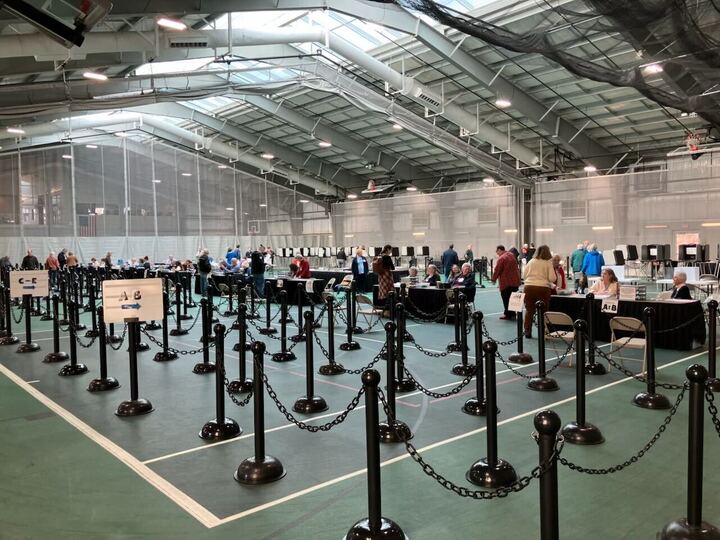
Voting was slow but steady Tuesday at Thomas College’s Harold Alfond Athletic Center in Waterville.
Martha Shattuck, 74, of Waterville, said after voting that she supported a question allowing city managers to live out of town.
— Amy Calder, staff writer
11:15 a.m.: Winslow voters focus on state questions
Winslow resident Pauline Veilleux, 76, said, as she exited the polls at Veterans of Foreign Wars Post 8835, that she voted no on Question 1 and yes on 2.
“I want it to stay the way it is,” she said of Question 1. “ It’s going to prohibit people from voting. I voted yes on 2, but I could have gone either way. We have the yellow flag law — that’s important.”
In the race for town council, Veilleux said her goal was to not support any MAGA (Make America Great Again) candidates, so she voted for a friend who will listen to both sides of issues.
“We need somebody who will listen to both sides of issues instead of just saying, ‘We know better — we’re going to do it,’” she said.
Resident Joe Works, 77, said he voted no on both questions and didn’t vote on the council race because he doesn’t know the candidates.
“I kind of want to leave things the way they are,” he said of Question 1. “ It’s too restrictive as far as I’m concerned. Number 2, same thing. I think we just need to leave it alone.”
— Amy Calder, staff writer
10:55 a.m.: In Portland, voters motivated by minimum wage proposal
The ballot counter read 415 late Tuesday morning at the Portland Exposition Building. There were no lines at the polling place, but a steady stream of voters trickled in and out.
Voters leaving the Expo said they were motivated by a desire to have a say in a changing world. Some said in a chaotic political environment, voting on state and local ballot initiatives was a way of feeling in control.
For Matt Erickson, 45, the most important measure was Portland’s minimum wage referendum, which if approved would incrementally raise the minimum wage to $19 by 2028.
“They’re asking for a livable wage, not an excellent wage,” Erickson said.
He said costs have been rising in the city for a long time and that Portland’s pandemic-era increased hazard pay wages show the city can do something about low wages when it needs to.
— Riley Board, staff writer
10:25 a.m.: These voters can cast their ballots and get a biscotti
In the kitchen at the Italian Center in Portland, Bob Lax was filling cannoli with the kind of precision one might use to perfectly fill in the ovals on a ballot.
“It’s a breeze, “ he said as he piped a generous amount of cream inside the shell. The center will sell as many as 500 cannoli today.
Some polling places across the state Tuesday will host bake sales for those who want a sweet treat in addition to an “I Voted” sticker. At the Italian Heritage Center, members spend the days leading up to an election baking biscotti, ricotta pie and anise cookies. They’ll be serving lunch later in the day, but people were lined up for baked goods and ballots when Katie Guzman arrived at 7:30 a.m.
“Can I get a breakfast cannoli?” one voter asked Guzman.
Proceeds benefit the Italian Heritage Center. The volunteers running the sale can only take cash, Guzman said, but the center has an ATM at the ready.
— Megan Gray, staff writer
10:05 a.m.: Portland election workers expect referendums to drive turnout
Dale Kinney had a full box of fresh pens on the table in front of him at Portland’s Italian Heritage Center on Tuesday. His neighbor encouraged him to apply to be an election worker nearly 40 years ago, and now he’s the warden in this district.
Morning traffic was steady, and by 8:30 a.m., 327 voters had cast their ballots. Kinney noticed that some people filled out the state ballot but not the municipal one, an indicator that the referendum questions on voter ID and a red flag law were driving traffic.
“There’s important questions bringing different groups out,” he said.
He’s already thinking about next year, when big elections for Maine’s governor and other offices will likely draw a high turnout. Anyone interested in applying to be an election worker can visit portlandmaine.gov or go to City Hall in person. The position is paid $15 an hour, according to the city website, and training will be provided.
Nine people were working at the Italian Heritage Center on Tuesday, Kinney said, but 2026 will require more staff.
Kinney likes making sure that Election Day goes smoothly for voters.
“It’s a very good, well-thought-out, methodical process,” he said. “Nobody should have any doubts.”
— Megan Gray, staff writer
10 a.m.: Voting rights a key issue for South Portland voters
Katie Vail always votes, no matter what or who is on the ballot. She considers voting a duty, and a right.
That’s why the issue that mattered most to her, as she prepared to vote at the Boys & Girls Club on Broadway in South Portland, was Question 1, which seeks to place restrictions on voting and limits on absentee ballots.
“I’m here to vote no on Question 1. I don’t want absentee voting to be harder,” said Vail, 43, of South Portland, who works as a lawyer. “I can’t always make it here. Sometimes I might be traveling.”
Casey Oakes said he felt strongly about both statewide referendums, including the so-called “red flag” law that would allow for courts to take guns away from someone if their family can show they pose a significant danger to themselves or others. Oakes said he was voting no on Question 1 and yes on the “red flag” law.
“I really think people need the ability and access to vote,” said Oakes, 34, of South Portland, who works for the arts presenter Portland Ovations. “I thought both of those questions had gotten a lot of attention. But I show up here and there’s almost nobody here, compared to last time I voted (during a presidential election).”
Turnout in the first couple of hours Tuesday was lighter than normal for a year with no major statewide or national races, said District 1 ward clerk Phil Gaven. At around 9 a.m., after the Boys & Girls Club had been open a couple of hours, there were only about three people in line to vote and less than a dozen at voting stations.
— Ray Routhier, staff writer
9:45 a.m. Lewiston voters come out for Question 2
Gale Shannon votes in every election, but said Question 2 hits close to home.
Outside the Longley School polling location Tuesday morning, voters talked about the proposed “red flag” law that Question 2 would create.
Shannon said it’s “important to have,” and is especially meaningful for Lewiston residents who have continued to see evidence that such a law was needed in the days and weeks before the Oct. 25, 2023, mass shooting.
Glenn Therrian believes the opposite. He said he says it as an easier way “to start taking guns away from citizens that probably wouldn’t have a say.”
He said he’s worried it could be used in personal disputes, like a falling out with a spouse, rather than instances of serious mental health concerns.
“Who’s the one to really say you don’t deserve your guns today?” he said.
— Andrew Rice, staff writer
9:30 a.m. Some Biddeford voters say city spending is key issue in mayor’s race

In Biddeford, three candidates are vying for the mayor’s seat: incumbent Marty Grohman, City Council president Liam LaFountain and City Councilor Norman Belanger.
Standing outside Biddeford High School, lifelong resident Darcy LaCourse, said she voted for Grohman during the last election. But this year, she cast her ballot for Norman Belanger, an “old-school” candidate she and her husband hope could rein in tax hikes if elected.
The 51-year-old was unsure about the candidate’s odds, as she saw relatively of his few campaign signs, and he did not seem to make as many appearances in public or on social media as his two opponents.
“People like to see that they’re making an effort out here,” she said. “That’s kind of what made me vote for Marty the first time around, because he was out here. But you’ve got to look beyond that.”
Her husband, 59-year-old Dale LaCourse, said the city needs to get its spending under control. And he expressed doubt that either the incumbent mayor or the current city council president, Liam LaFountain, could do so.
“You can’t rubber-stamp absolutely everything that comes across your desk and not expect taxes to go up, and up and up,” he said. “And that’s kind of what’s happening.”
— Daniel Kool, staff writer
9 a.m.: Stronger absentee turnout than 2023, secretary of state says
By Monday, the state had accepted more than 122,000 absentee ballots, according to the Office of the Secretary of State.
Secretary of State Shenna Bellows said this year’s absentee turnout was higher than in 2023.
“That is a good indicator for strong turnout this year,” she said at the Biddeford polling place.
Last year’s absentee turnout was still higher, but Bellows said presidential elections typically see the highest levels of voter engagement.
All told, Mainers requested more than 145,000 absentee ballots.
— Daniel Kool, staff writer
8:30 a.m.: In Biddeford, Maine secretary of state highlights voter turnout
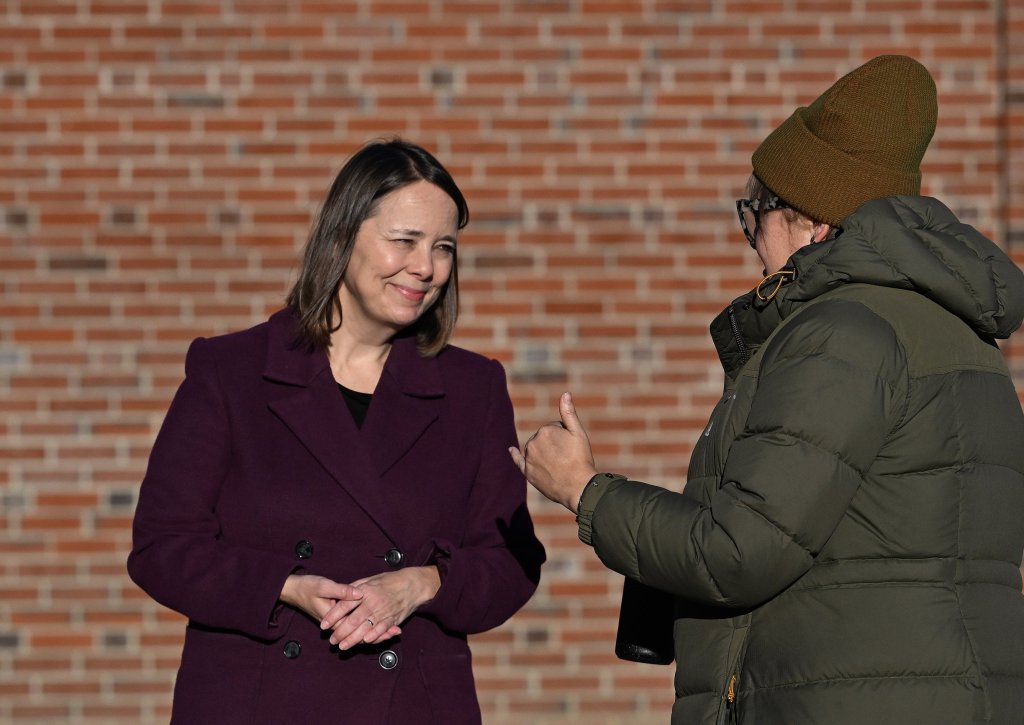
Maine Secretary of State Shenna Bellows said voter turnout appeared strong in Biddeford, where she spoke to residents lined up outside the polling station before it opened at 7 a.m.
“That’s probably because there are 28 candidates on the ballot,” she said, stepping into the gym at Biddeford High School. That includes mayoral, school board and city council seats.
Bellows said the results of both statewide referendum questions on Tuesday’s ballot could be tight, pointing to recent polling that showed Mainers were relatively evenly split on both questions.
“We’ll know tonight whether things are close or not. If it’s less than 1%, then it’s a free recount,” she said.
— Daniel Kool, staff writer
7:30 a.m.: Biddeford candidates organize Election Day food drive
A group of municipal candidates in Biddeford organized a food drive outside the polling place at Biddeford High School.
A tent will be open until 8 p.m. just outside the Tiger Gym to collect donations for the Biddeford Food Pantry.
Local need for food assistance is high during fall and winter when households face higher utility and heating costs, according to organizers. The food pantry is also facing increased pressure as households face a possible lapse in benefits this month because of the government shutdown.
The highest needs at the Biddeford Food Pantry include cereal, peanut butter, rice, pasta, shelf-stable snacks, diapers, paper towels, toilet paper and hygiene products.
— Gillian Graham, staff writer
6:40 a.m.: A busy start in Buxton
With nearly 10 minutes to go before polls in Buxton opened, a dozen residents crowded inside the town hall doors, eager to cast their ballots.
As the clock hit 6 a.m. and poll workers started handing out ballots, a steady stream of cars pulled into the parking lot, their headlights cutting through the pre-dawn darkness.
In Buxton, one of the first towns in the state to open on Election Day, an early rush is never a surprise.
June Curtis stopped by on her way to work as an instructor and was one of the first residents to feed their ballot into the counting machine. She never misses an election.
“I think right now voting is more important than ever before,” she said.

Glen O’Donnell, a 62-year-old construction manager, was finished voting by 6:03 a.m. He always votes and said he was especially motivated this year to weigh in on the state referendum questions.
“I believe in the election system,” he said. “If we don’t have something we like, we have have to vote change it.”
Town Clerk John Myers said more than 900 of Buxton’s 6,400 registered voters cast absentee ballots. He expected double that number to show up at the polls on Tuesday, even though they’re only voting on the statewide referendums.
“It shows people understand the importance of the topics on the ballot and have an opinion,” he said.
— Gillian Graham, staff writer
6 a.m.: Polls open in some communities
Polling places across Maine are beginning to open.
The earliest Election Day voters are cast in communities like Buxton and Kennebunk that open polling places at 6 a.m. Many communities, including Portland and Biddeford, open at 7 a.m.
Towns with 500 residents or more are required to open polling locations by 8 a.m., while towns with fewer than 500 people don’t have to start until 10 a.m.
All voting places close at 8 p.m. Any voters waiting in line when the polls close are still able to cast their ballots and should stay in line.
People who are unsure of their voting location can find it through the Maine Voter Information Lookup Service.
— Gillian Graham, staff writer

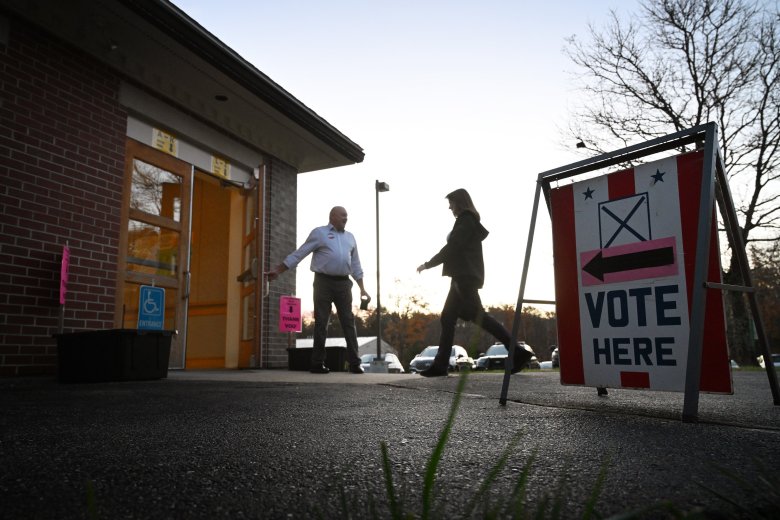
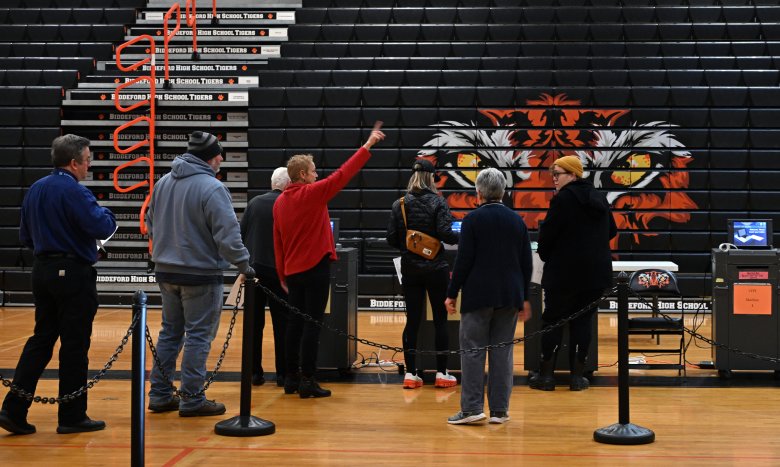
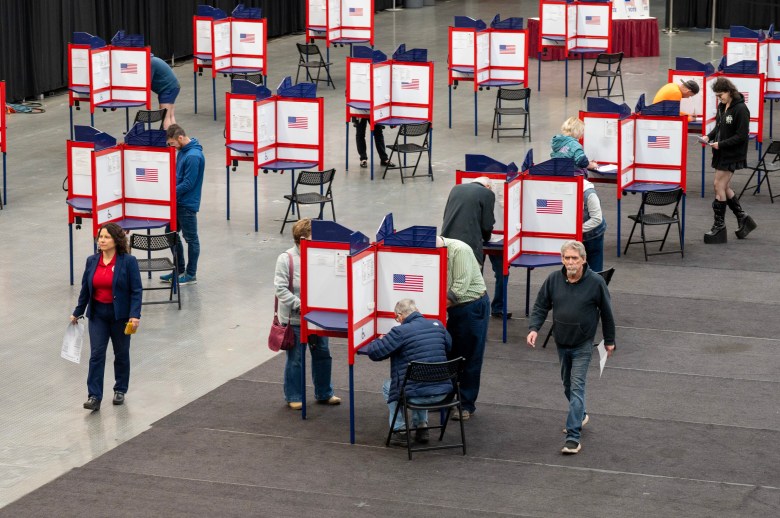
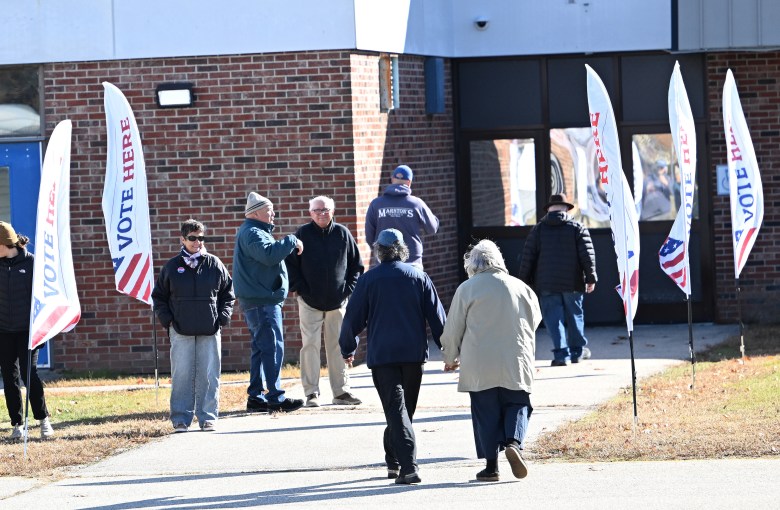
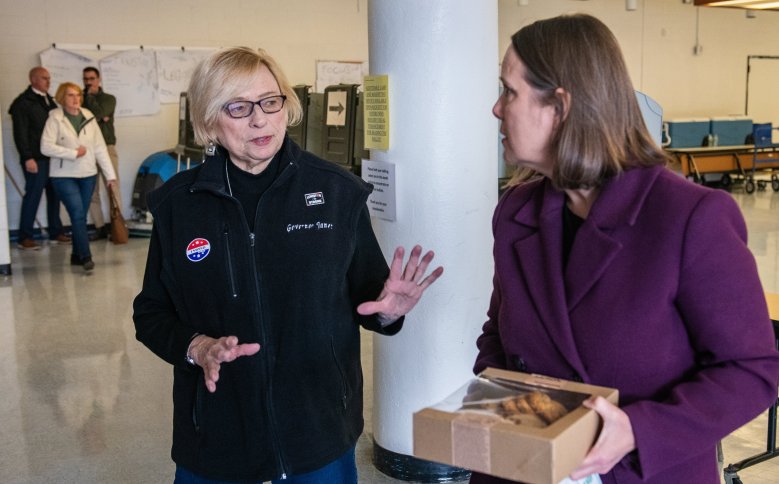
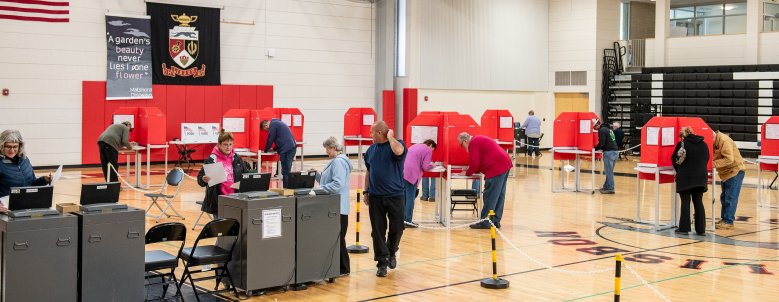
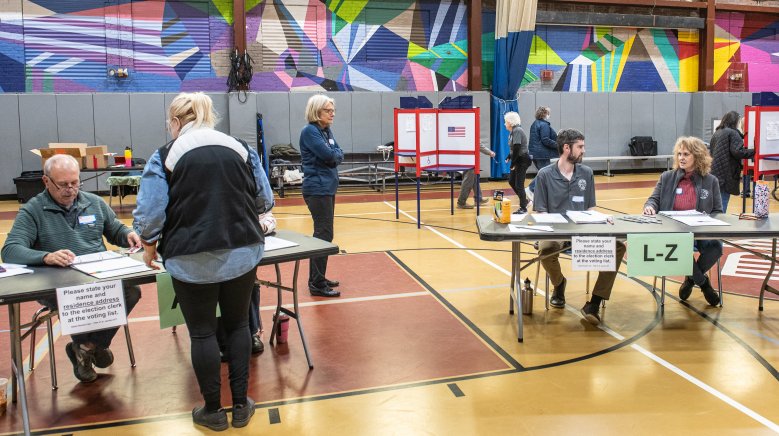

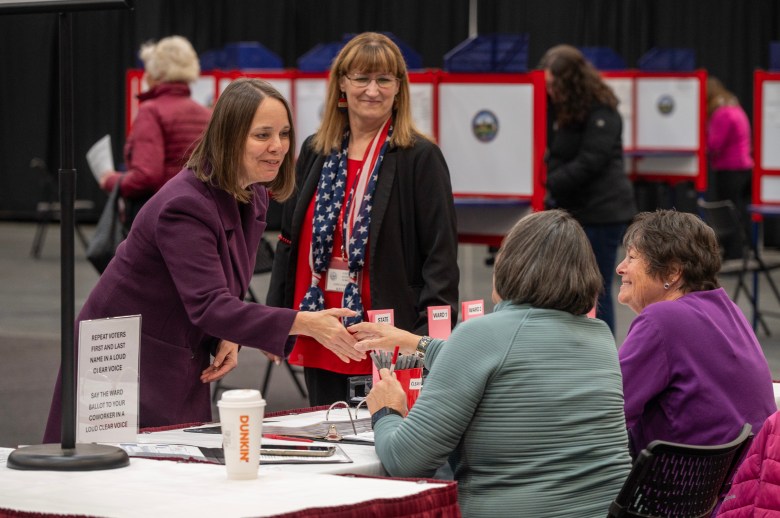
We invite you to add your comments. We encourage a thoughtful exchange of ideas and information on this website. By joining the conversation, you are agreeing to our commenting policy and terms of use. More information is found on our FAQs. You can modify your screen name here.
Comments are managed by our staff during regular business hours Monday through Friday as well as limited hours on Saturday and Sunday. Comments held for moderation outside of those hours may take longer to approve.
Join the Conversation
Please sign into your CentralMaine.com account to participate in conversations below. If you do not have an account, you can register or subscribe. Questions? Please see our FAQs.